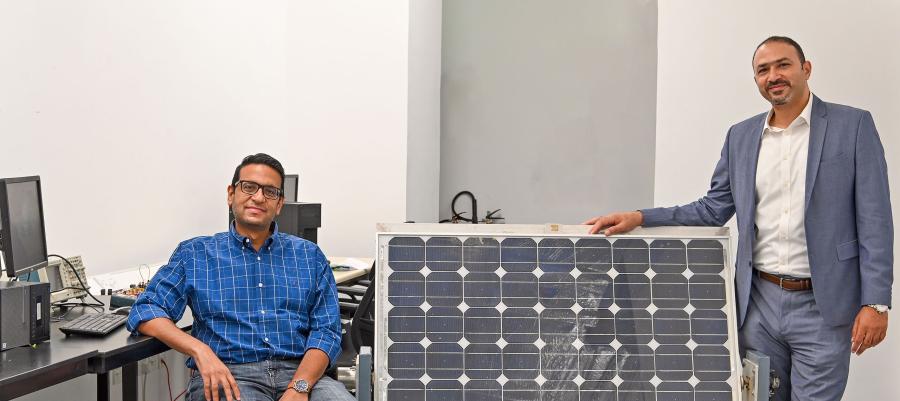- About
- Admissions
- Study at AUS
- Prospective Students
- Bachelor's Degrees
- Master's Degrees
- Doctoral Degrees
- Admission Publications
- International Students
- Contact Admissions
- Grants and Scholarships
- Sponsorship Liaison Services
- Testing Center
- New Undergraduate Student Guide
- New Graduate Student Guide
- File Completion
- New Student Orientation
- Payment Guide
- Executive Education
- Students with Disabilities
- Academics
- Life at AUS
- Research
- Contact Us
- Apply Now
- .

AUS researchers develop novel model to boost solar energy production
Two researchers at American University of Sharjah (AUS) have developed a novel mathematical model that determines the appropriate time to clean solar panels of dust accumulation, leading to an increase in energy generation.
Conducted by Dr. Mostafa Shaaban, Associate Professor and Dr. Mahmoud Ibrahim, Professor in Electrical Engineering at AUS, the study was sponsored by AUS and Rentech Systems LLC, an enterprise that designs and installs renewable technology systems in the UAE. The research contributes to the implementation of the UAE Energy Strategy 2050, which aims to increase the contribution of clean energy and reduce the carbon footprint of power generation.
“Solar systems are currently considered a viable energy alternative source in the Middle East and other parts of the world. The UAE is no exception in its eagerness to harness electrical energy from the sun. Several projects launched in Abu Dhabi and Dubai are expected to achieve massive growth in the coming decades. Dust accumulation is one of the major challenges any solar system will face, especially in light of the weather in this region. Cleaning the solar panels is costly, which means they are only cleaned when needed. What we have produced is a novel mathematical model that can estimate the optimal timing for cleaning solar panels, based on the photovoltaic output power and environmental conditions,” explained Dr. Shaaban.
He added: “We usually do not have a way to know how much dust is accumulated on solar panels. Dust accumulation and weather conditions cause a reduction in power output. The proposed model estimates the amount of dust on the panels and helps schedule their cleaning. As a result, we do not carry out unnecessary cleaning operations and waste resources, and we do not leave the dust to accumulate.”
The study found that optimal cleaning can result in 27.3 percent added energy generation and recommended following different seasonal cleaning patterns.
“Varying the cleaning frequency according to the season is better than having a fixed cleaning schedule for the whole year. The proposed model is the first of its kind in the field. We expect many applications for the proposed model and more advanced versions to be developed. Many studies on solar farm sizing need to consider the impact of dust when implemented in the Middle East or similar environments,” explained Dr. Ibrahim.
The researchers have published two papers on the subject in the journals Energies and Applied Energy and are looking forward to further developing this model and seeing it adopted by renewable energy companies. They noted that Rentech Systems LLC is planning to adopt their model for scheduling solar panel cleaning.
“This project will help achieve broad and long-term goals and contribute positively to clean and efficient power systems across the United Arab Emirates, the region and beyond. It will also provide data and guidance to enhance power systems and the renewable generation portfolio in the UAE, as well as build tools to help maintain renewable energy sources, save energy and improve sustainability,” said Dr. Ibrahim.
The research complements other research being undertaken at AUS, including that conducted under the Petrofac Research Chair in Renewable Energy. Recent research under the chair includes that of an IoT edge device that can remotely assess the cleanliness of solar panels.
Electrical engineering is one of the most exciting branches of engineering and is at the forefront of shaping the future of the world. The College of Engineering at AUS is known for its highly acclaimed undergraduate and graduate degrees in electrical engineering, with AUS ranked among the top two (tied) in the UAE and top 300 universities globally for electrical and electronic engineering, according to QS World University Subject Rankings (2022). . Strongly connected to today's industry environment, the AUS electrical engineering degree programs are designed to ensure that students will be able to employ their knowledge, analysis and design skills in realizing engineering systems that advance the frontiers of science and technology.
For more information about the Department of Electrical Engineering at AUS, visit www.aus.edu/cen/department-of-electrical-engineering.

